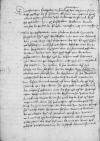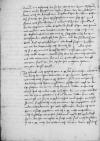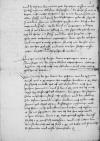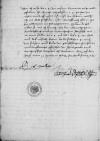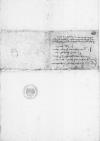Es seinn mir nechtenn speth meines guttenn frundes ⌊Jobst Ludewigs⌋ ⌊⌋ / und disse beÿ gebundenn, an E(wer) G(naden) zcwschickenn, / zcwkomen, / daraus, / wie sich die hendel in ⌊Hungern⌋ vorloffen, E(wer) G(naden) wirt vorsthen etc.
Mir hot ⌊⌋ mein sunderer freundt ⌊Cornelius Scepperus⌋, ⌊kaÿ(serliche)r maÿ(este)t⌋ botschaffter, vonn ⌊Wien⌋ aus ⌊Osterreich⌋ denn 18 tag Marcÿ negst vorgangenn, / das ⌊ro(mische)r ko(nigliche)r maÿ(este)t⌋ sachen gelugkseligenn unnd fast wol sthenn. / Befestiget alles, das in denn beÿgelegtenn copeÿenn vonn ⌊Constantinopel⌋ gefunden, / donebenn das im vonn ⌊kaÿ(serliche)r maÿ(este)t⌋ hoffe vonn ⌊Bonanienn⌋ geschriebenn, / das kay(serlich)e ma(ieste)t den lecztenn tagk Februarÿ vonn Bononien gen ⌊Alexandrien⌋, / nicht weÿt vonn ⌊Meÿland⌋, / sich begebenn / im willenn do zcw warttenn, / bisz zcw ⌊Genua⌋ mit denn schiffenn zcw der uberfart inn ⌊Hispanien⌋ / alleding wirt fertigk sein. / Die ⌊keÿserinne⌋ ist zcw ⌊Barzalona⌋, / welche stad hartte am mehre leith im land ⌊Catalonien⌋ inn ⌊Hispanienn⌋ / und warteth uff denn ⌊kaÿser⌋, / der uff disse osterliche czeit dohin komen sal. / Gott gebe mit glucke / und das vorgewisz gehaltenn wirt, / das ⌊kaÿ(serlich)e ma(jeste)t⌋ uff den zwkunfftigenn herbst widerumb mit der ⌊kaÿserinne⌋ in ⌊Italien⌋ ins konigkreich ⌊Naples⌋ komen sal / unnd das do kaÿ(serlich)e m(aieste)t hette vorgenomenn seinen sicz zcwmachenn uff eine langeczeith. Auch das eÿne newe liga oder buntnus inn ⌊Italien⌋ gemacht seÿ, / welcher ligen houptman sol sein ⌊Antonius de Lieua⌋, / der vor alleczeit ⌊kaÿ(serliche)r m(aieste)t⌋ hauptman gewest inn Italienn / unnd nemlich ⌊Meÿland⌋ solange erhaltenn. / Es ist ime auch geschriebenn, das ⌊bap(stlich)e heÿ(ligkei)t⌋ vonn ⌊Bononie⌋ eÿn breve hott geschickt ins ⌊Niderland⌋ an die bischoffe Morinensem und  GStA, PK, HBA, C 2, No 37, f. 1v Toracen(n) / mit befhelich, das sie das uberal inn irenn bischtu(m)b(en) sollenn vor die kÿrchturenn lossenn sloenn. / Inn dem selbtigenn breve wirth der ⌊konigk vonn Engelland⌋ inn den bann gethan, / bisz so lange her seÿne ⌊beÿschlefferinne⌋ vonn sich thu / unnd seÿnne vorlossene ⌊konÿginne⌋ widerumb zcw im nheme / und das die ⌊Schottenn⌋ wider ⌊Engellandt⌋ starck czihen. / Was hiraus wil werdenn, wirt die czeit mit bringenn. / Tregt nicht mit der koffleut czeittung uber eins etc. Schreÿbet auch, das inn ⌊Deutschlanden⌋ alledingk stille seÿnn / und das sunderlich von Gotte ⌊kaÿ(serliche)r m(aieste)t⌋ glugkseligenn alle dingk sachenn zcwschen wie wol das regimenth nicht dornoch seÿ etc. Dis habe ich so E(wer) G(naden), / wie mirs zcwgeschribenn, / wilfariger meÿnung / nicht woldt bergenn. / Wolde sich Gott der allemechtige uber uns alle erbarmenn, / das wir ein czeitlangk gutten, langk werigenn frÿed inn der christenheitt mochtenn habenn. / Wer eÿnn grosse genadt. /
GStA, PK, HBA, C 2, No 37, f. 1v Toracen(n) / mit befhelich, das sie das uberal inn irenn bischtu(m)b(en) sollenn vor die kÿrchturenn lossenn sloenn. / Inn dem selbtigenn breve wirth der ⌊konigk vonn Engelland⌋ inn den bann gethan, / bisz so lange her seÿne ⌊beÿschlefferinne⌋ vonn sich thu / unnd seÿnne vorlossene ⌊konÿginne⌋ widerumb zcw im nheme / und das die ⌊Schottenn⌋ wider ⌊Engellandt⌋ starck czihen. / Was hiraus wil werdenn, wirt die czeit mit bringenn. / Tregt nicht mit der koffleut czeittung uber eins etc. Schreÿbet auch, das inn ⌊Deutschlanden⌋ alledingk stille seÿnn / und das sunderlich von Gotte ⌊kaÿ(serliche)r m(aieste)t⌋ glugkseligenn alle dingk sachenn zcwschen wie wol das regimenth nicht dornoch seÿ etc. Dis habe ich so E(wer) G(naden), / wie mirs zcwgeschribenn, / wilfariger meÿnung / nicht woldt bergenn. / Wolde sich Gott der allemechtige uber uns alle erbarmenn, / das wir ein czeitlangk gutten, langk werigenn frÿed inn der christenheitt mochtenn habenn. / Wer eÿnn grosse genadt. /
Ich bedanck mich hochlich genn E(wer) G(naden) des fruntlichen erbittens, mir durch denn hern ⌊doctor⌋ inn E(wer) G(naden) nhamen / gethann. / Wil mich auch so gen E(wer) G(naden) haltenn, / sovil mir mugelich, / das durch mich keÿnn misfallenn gesche. / Nu negst in der ehe sachenn, / dar innen mich ⌊der vonn Alden⌋ unczimlich betast, / hab ich anders nicht torst(!) thun, / dan mir meÿn obrikeÿt aus der ⌊Cronn⌋ gebottenn. / Und nu ⌊der von Alden⌋ so an alle vornunfft mit seiner ungestumigheit unnd hochen unweisen sÿnnen / so uffentlich mich vor allenn hot angegebenn / und wider mich iderman hot wolt uffbringen, / darzcw ich ime keÿnn ursache gegebenn, / wil ich E(wer) G(naden) nicht vorhaldenn, / auch dasselbige, wor es czeit, / stelle unnd weÿle hot, / gestendigk seÿnn, / das her mir gesagt, / er frogt nicht fiel noch der sachen, so ers E(wer) G(naden) nicht zcw willenn teth, / die inn darein gefurt etc.  GStA, PK, HBA, C 2, No 37, f. 2r Unnd do ich ime das antwurt gab, / das ich an wissenn unnd zcwlosz meÿnner eldestenn bischoffenn / die czeuge, / so wie er begert, / nicht mochte vorhorenn, / hot er mir des antwurts mit allem fleÿsz / unnd gancz demuttigklichenn gedanckt, / sagendt, / so wurde er seÿnnem widertheil grossernn, / dan durch andere wege, / vordrisz thun. / Wider das ist er zcwgangenn und hott mich so vor idermennigklich / an alle schembde, / gleich wie ich die czeuge mit fleisz / unnd dem theil zcwgutte, / nicht habe wolt vorhoerenn, / angetragenn, / doran her der worheit / unnd mir gros unrecht gethann. / Sol auch mit der czeit vonn der worheit gestrofft / unnd vonn mir / inn solchem unsÿnnÿgem vorgebenn im superinscribed, in the hand of Dantiscus⌈imim superinscribed, in the hand of Dantiscus⌉ nichts geschenckt werdenn. /
GStA, PK, HBA, C 2, No 37, f. 2r Unnd do ich ime das antwurt gab, / das ich an wissenn unnd zcwlosz meÿnner eldestenn bischoffenn / die czeuge, / so wie er begert, / nicht mochte vorhorenn, / hot er mir des antwurts mit allem fleÿsz / unnd gancz demuttigklichenn gedanckt, / sagendt, / so wurde er seÿnnem widertheil grossernn, / dan durch andere wege, / vordrisz thun. / Wider das ist er zcwgangenn und hott mich so vor idermennigklich / an alle schembde, / gleich wie ich die czeuge mit fleisz / unnd dem theil zcwgutte, / nicht habe wolt vorhoerenn, / angetragenn, / doran her der worheit / unnd mir gros unrecht gethann. / Sol auch mit der czeit vonn der worheit gestrofft / unnd vonn mir / inn solchem unsÿnnÿgem vorgebenn im superinscribed, in the hand of Dantiscus⌈imim superinscribed, in the hand of Dantiscus⌉ nichts geschenckt werdenn. /
Es hot mir auch der her ⌊doctor⌋ angetragenn, was E(wer) G(naden) tromslager mit der / meÿns klosters abgewichnenn / belangt, / darÿnnen ich mich recht wil erkundenn / unnd aller billigheit gemesz haltenn. /
Was mir auch der her ⌊doctor⌋ inn geheÿm, / was die execucion betrifft, / vonn E(wer) G(naden) wegenn hot angesagt, / donebenn E(wer) G(naden) beger fleissiglich entdeckt, / hab ich wol vorstandenn, / auch zcw herczenn genomenn. / Unnd so dan E(wer) G(naden) weis, wie ich mich negst zcw ⌊Resentburgk⌋ erbottenn, / das ich inn der sachenn zcuvor muglichenn fleisz nicht gespart / unnd, das alleding zcum bestenn gewendt mugenn werdenn, / noch vordan nicht sparenn wÿl, / bleÿb ich inn derselbigenn meÿnung. / Will auch keÿnn muhe, / bedenckenn / unnd arbeit / noch lossenn, / es seÿ mit schreÿbenn, / oder wie ich das zcw[3] wege werde mugenn bringen, / domit E(wer) G(naden) beger genugk gesche. / Doruff sal sich E(wer) G(naden) genczlich vorlossenn / unnd nicht allein inn dem, / sunder auch wor ich sunst E(wer) G(naden) vil liebes und fruntlichs dinstsumber werd wissen zcwerczeigen etc.  GStA, PK, HBA, C 2, No 37, f. 2v
GStA, PK, HBA, C 2, No 37, f. 2v
Wan ich wuste, das E(wer) G(naden) inn unsernn ceremonien truge wollgefallenn, / het ich nicht noch gelossenn, E(wer) G(naden) hie her, / inn meÿnn armut, / uff meÿne erste messe zcw bittenn, / welche ich, / mit Gots hulffe, / denn erstenn sontagk noch ostern[4] / hie zcw volbringenn mir hab vorgenomenn. / So dann die czeit anders ist, / wil ich dennoch / Gott denn allemechtigenn / demuttigklich unnd mit worem herczenn fleissigk, / wie ein armer sunder, / vor E(wer) G(naden) und alles, das E(wer) G(naden) ann sele und leib nuczlich, / bittenn, / der die selbige E(wer) G(naden) mith irer ⌊furstÿnn⌋ unnd kinder inn gelugkseligem zcunhemen unnd langkweriger gesuntheit inn seÿner genade unnd barmherczikeÿt langeczeit thu bewarenn. /
 GStA, PK, HBA, C 2, No 37, f. 3v
GStA, PK, HBA, C 2, No 37, f. 3v  GStA, PK, HBA, C 2, No 37, f. 1r
GStA, PK, HBA, C 2, No 37, f. 1r  GStA, PK, HBA, C 2, No 37, f. 1v Toracen(n) / mit befhelich, das sie das uberal inn irenn bischtu(m)b(en) sollenn vor die kÿrchturenn lossenn sloenn. / Inn dem selbtigenn breve wirth der
GStA, PK, HBA, C 2, No 37, f. 1v Toracen(n) / mit befhelich, das sie das uberal inn irenn bischtu(m)b(en) sollenn vor die kÿrchturenn lossenn sloenn. / Inn dem selbtigenn breve wirth der  GStA, PK, HBA, C 2, No 37, f. 2r Unnd do ich ime das antwurt gab, / das ich an wissenn unnd zcwlosz meÿnner eldestenn bischoffenn / die czeuge, / so wie er begert, / nicht mochte vorhorenn, / hot er mir des antwurts mit allem fleÿsz / unnd gancz demuttigklichenn gedanckt, / sagendt, / so wurde er seÿnnem widertheil grossernn, / dan durch andere wege, / vordrisz thun. / Wider das ist er zcwgangenn und hott mich so vor idermennigklich / an alle schembde, / gleich wie ich die czeuge mit fleisz / unnd dem theil zcwgutte, / nicht habe wolt vorhoerenn, / angetragenn, / doran her der worheit / unnd mir gros unrecht gethann. / Sol auch mit der czeit vonn der worheit gestrofft / unnd vonn mir / inn solchem unsÿnnÿgem vorgebenn im superinscribed, in the hand of Dantiscus⌈imim superinscribed, in the hand of Dantiscus⌉ nichts geschenckt werdenn. /
GStA, PK, HBA, C 2, No 37, f. 2r Unnd do ich ime das antwurt gab, / das ich an wissenn unnd zcwlosz meÿnner eldestenn bischoffenn / die czeuge, / so wie er begert, / nicht mochte vorhorenn, / hot er mir des antwurts mit allem fleÿsz / unnd gancz demuttigklichenn gedanckt, / sagendt, / so wurde er seÿnnem widertheil grossernn, / dan durch andere wege, / vordrisz thun. / Wider das ist er zcwgangenn und hott mich so vor idermennigklich / an alle schembde, / gleich wie ich die czeuge mit fleisz / unnd dem theil zcwgutte, / nicht habe wolt vorhoerenn, / angetragenn, / doran her der worheit / unnd mir gros unrecht gethann. / Sol auch mit der czeit vonn der worheit gestrofft / unnd vonn mir / inn solchem unsÿnnÿgem vorgebenn im superinscribed, in the hand of Dantiscus⌈imim superinscribed, in the hand of Dantiscus⌉ nichts geschenckt werdenn. /
 GStA, PK, HBA, C 2, No 37, f. 2v
GStA, PK, HBA, C 2, No 37, f. 2v
